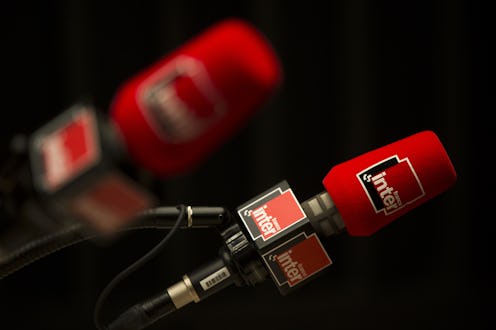News
Tune Into The Fifth Republican Debate On The Radio
As Republican presidential candidates lay into each other on Tuesday, many will watch on CNN — scanning the candidates' facial expressions for signs of sincerity, trustworthiness, empathy, and other qualities lacking as of late from the majority of the GOP contenders. Some, though, will opt to listen on the radio, assessing through voice alone who will be the best option to lead the country. For those without TV — or those without cable or satellite — Salem Radio will simulcast the Republican debate nationwide, bringing what we can hope is a productive, respectable conversation on the nation's issues into cars, homes, and businesses across the country.
Salem Radio Network is a radio broadcaster that specializes in Christian and conservative news talk programming and is broadcast through more than 2,000 affiliates nationwide. Its news and talk stations feature nine live talk shows including The Hugh Hewitt Show, which is hosted by conservative political commentator Hugh Hewitt. As part Salem's partnership with CNN, Hewitt will serve as one of the moderators at Tuesday's debate along with CNN's chief political correspondent Dana Bash. The two will assist moderator Wolf Blitzer, CNN's lead political anchor, throughout the debate. Salem Radio will also host pre-debate and post-debate coverage through its many radio stations as well as online streaming.
Hewitt, a lawyer by training, served during the Reagan Administration for six years, both at the White House and as an assistant to two Attorneys General. After his time in Washington, he moved back to California where he got his start in media at a Los Angeles PBS affiliate, hosting a nightly news and public affairs program until 2007. He started hosting his radio show in 2000, which pulls in around two million listeners a week.
In November, CNN announced the criteria for Tuesday's debate, which will be held at the Venetian in Las Vegas. The criteria consists of polling requirements that candidates must meet to qualify for the debate. The new polling requirements should help New Jersey Gov. Chris Christie but may hurt Kentucky Sen. Rand Paul. Candidates must poll at either 3.5 percent nationally, 4 percent in Iowa, or 4 percent in New Hampshire on average between Oct. 29 and Dec. 13. At the time of the announcement that would have included nine main stage candidates: former Florida Gov. Jeb Bush, Dr. Ben Carson, Christie, Texas Sen. Ted Cruz, Carly Fiorina, Ohio Gov. John Kasich, Paul, Florida Sen. Marco Rubio, and Donald Trump.
Christie was moved down a peg to the undercard debate hosted by Fox Business Network in November. This time he should be safe. He is not polling high enough nationally, but he meets the threshold in New Hampshire. Paul, on the other hand, is currently polling right under 4 percent in New Hampshire. The final polls leading up to the debate will make or break his primetime turnout. For the undercard debate, candidates only need to poll at 1 percent in four separate national, Iowa, or New Hampshire polls.
Whether you tune in on CNN, a Salem radio station or online, you better come prepared for some cringe-worthy moments. If past debates and recent anti-Muslim comments from Trump are a preview of Tuesday's level of decorum, you might want a drink at hand.
